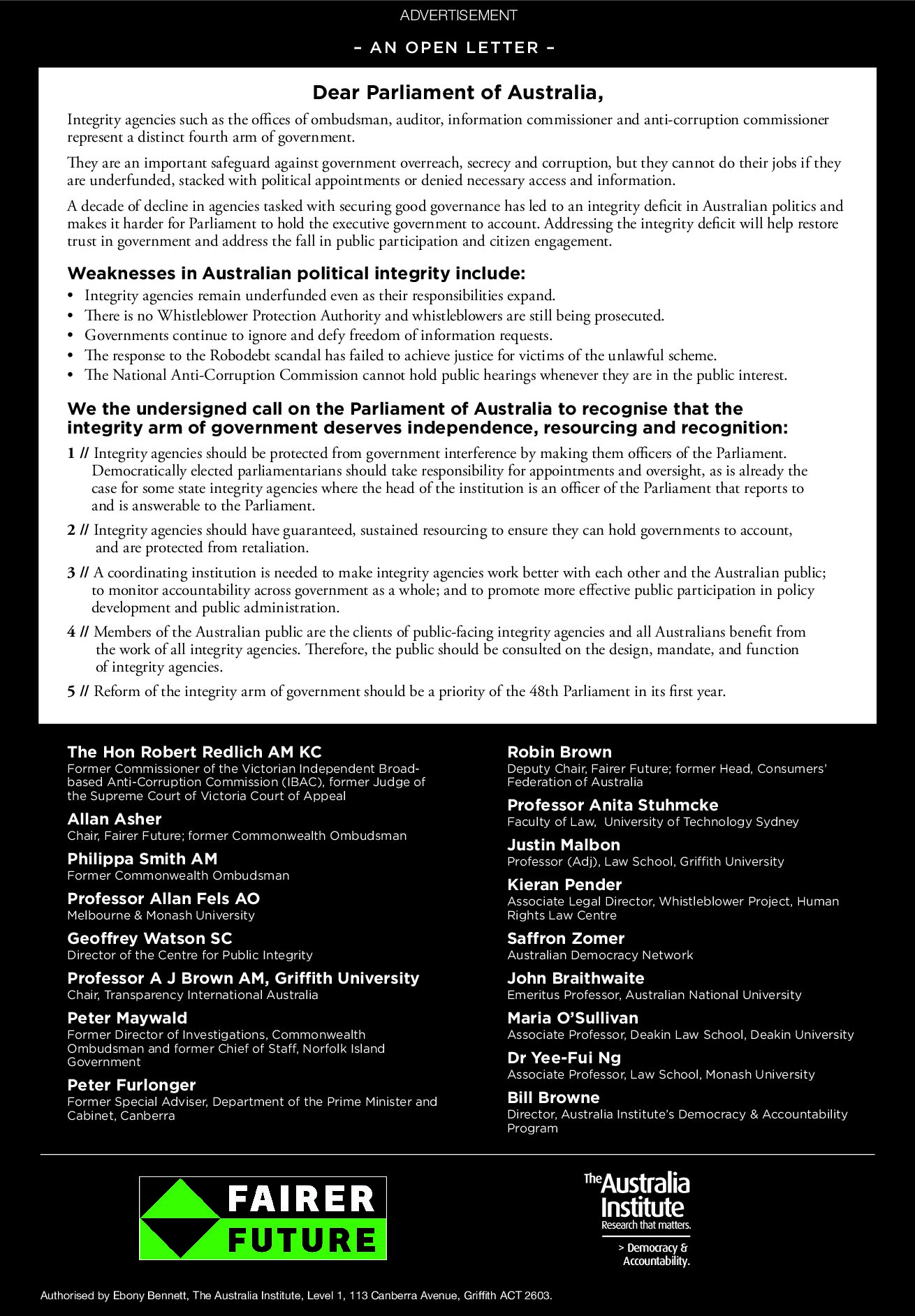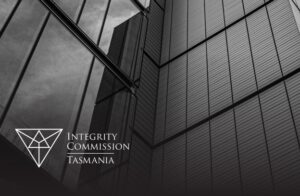Six ideas to fix Australia’s secrecy problem

The Australia Institute’s inaugural 2024 Transparency Summit brought together experts, whistleblowers and those working to ensure the interests of all Australians are represented in our policy-making process.
We are sleepwalking towards disaster when we accept the idea that the more secret we are about decision-making, the safer we’ll be.
– Richard Denniss, Executive Director of the Australia Institute

Here are six big ideas to reverse Australia’s culture of secrecy:
Public hearings in the National Anti-Corruption Commission
“Having the NACC operate in secrecy fights against integrity.”
– Senator David Shoebridge
The Albanese Government passed legislation to create the National Anti-Corruption Commission in 2022. The Commission’s role is to investigate serious corruption and so far these investigations have largely been taking place in the dark.
Preventing the commission from holding public hearings even when in the public interest to do so reduces transparency. Removing the limit on holding public hearings except in “exceptional circumstances” would enable the commission to openly demonstrate effective and appropriate measures are taken to investigate corruption.

Rewards for whistleblowers
“If we can look at [whistleblower rewards] not as an incentive for people to come forward, but as a way of supporting people who do come forward…giving somebody the support and protection and the ability to do things as a result of their whistleblowing.”
– Frank O’Toole, National Whistleblowing Advisory Group, Transparency International Australia
Recently the government has prosecuted several whistleblowers who exposed serious alleged misconduct. Australia Institute research finds most Australians say whistleblowers make Australia a better place.
In the US, whistleblowers are rewarded. Mary Inman from Whistleblower Partners spoke about the model of whistleblower rewards used in the US.
“The largest reward of all time was paid in May 2023 to one whistleblower – $279 million. The average award to whistleblowers is typically $5 million or less.”
These whistleblower rewards schemes have led to the explosion of reports about fraud, tax underpayment and organised crime.

Establishing a Whistleblower Protection Authority
“Whistleblowers are an important part of accountability and a healthy democracy. They risk their jobs, their reputations and safety to shine a light on wrongdoing. But for all that risk we have clearly fallen short.”
– Senator David Pocock
Whistleblower protections are critical to ensure those coming forward, can do so without fear of reprisal. Recent trials against whistleblowers in Australia have highlighted the need for protections.
At the Transparency Summit 2024, Senator David Pocock announced a private member’s bill to establish a whistleblower protection authority.
“It is time we finally gave whistleblowers the support they deserve because when they are protected, all of us benefit.”
Australia Institute polling finds that seven in ten Australians (71%) agree that whistleblower protections for public servants should be strengthened.

Refining freedom of information and secrecy laws
“Is Australia the world’s most secretive democracy? I’m not sure, but boy, we certainly have to be in the running for the title of democracy with the most secrecy laws.”
– Jake Blight, Independent National Security Legislation Monitor
Australia’s secrecy laws are needlessly broad and expansive – they are not fit for purpose.

Democratic mechanisms such as Freedom of Information (FOI) requests are crucial tools to the work of Grata Fund and individual “FOI warriors” like Rex Patrick.
In the public service, common practices mean legally valid FOI requests go unfulfilled.
“While there is an enormous amount of work that needs to be done in turning off that fire hydrant of lies, we also actually really need to be securing reliable, accurate information from the source, and the FOI system is designed to enable us to do that.”
– Isabelle Reinecke, Executive Director and Founder, Grata Fund.

“Transparency is a word only shouted from opposition benches.”
– Former senator Rex Patrick
Truth-telling
“Transparency and accountability are fundamental components of truth telling.”
– Professor Eleanor Bourke, Chair, Yoorrook Justice Commission
The Yoorrook Justice Commission is the first formal truth-telling process into historical and ongoing injustices experienced by First Peoples in Victoria.

Professor Eleanor Bourke, Chair, and Cindy Penrose, CEO, reflected on lessons from Australia’s first Indigenous-led truth-telling inquiry.
“If a nation is committed to being transparent in the present, it needs to be transparent about the past.”
– Cindy Penrose, CEO, Yoorrook Justice Commission
Australia’s culture of secrecy is partly rooted in an ongoing history of concealing the injustices against Australia’s First Peoples. Truth-telling processes present an opportunity for Australians to acknowledge that the path forward needs to be paved with truth about the past.
Protecting public interest journalism
“Democracy 101 says that we have to have a free press”
– Peter Greste, Journalist and Professor of Journalism, Macquarie University
The media landscape faces unprecedented challenges, from misinformation, audience fragmentation and political polarisation to fake AI-generated content.

On top of all of this, the government’s culture of secrecy impedes fearless journalism that holds power to account.
“Government has become closed and inward facing. Citizens sense this. We can’t understand why our own governments don’t want to talk to us anymore. And of course, the primary people doing that talking are journalists, working in the public interest.”
– Professor Chris Wallace – Canberra School of Politics, Economics and Society, University of Canberra
“When we look at disinformation – purposefully spread misinformation – the purpose of that is to erode institutions. The only antidote to that is transparency.”
– Head of Strategy & Public Affairs, Australian Associated Press
Secrecy is not security.
The Albanese Opposition spoke promisingly about the importance of a culture of disclosure and open government in the lead up to the 2022 election, but in government it has been lacking.
“On balance, when it comes to transparency, the Albanese government more closely resembles the Coalition government that preceded it, than “a big dose of Australian sunshine” – the promise of Albanese in opposition”
– Bill Browne, Director, Democracy & Accountability Program, The Australia Institute
In our climate policies, our defence procurement and even in how we develop our public policy – flimsy excuses obscure even flimsier decision-making.
Watch the speeches from the 2024 Transparency Summit here.

Between the Lines Newsletter
The biggest stories and the best analysis from the team at the Australia Institute, delivered to your inbox every fortnight.
You might also like
Open letter calls on newly elected Parliament to introduce Whistleblower Protection Authority, sustained funding for integrity agencies to protect from government pressure.
Integrity experts, including former judges, ombudsmen and leading academics, have signed an open letter, coordinated by The Australia Institute and Fairer Future and published today in The Canberra Times, calling on the newly elected Parliament of Australia to address weaknesses in Australian political integrity. The open letter warns that a decade of decline in agencies
Integrity 2.0 – whatever happened to the fourth arm of government?
Prime Minister Anthony Albanese came to office in 2022 promising a new era of integrity in government.
Underfunded, toothless and lacking transparency – time for a new era of integrity in Tasmania
As Tasmania’s newly elected politicians jostle to form government, new analysis from The Australia Institute shows that a deal to address integrity would be popular among election-weary voters.


